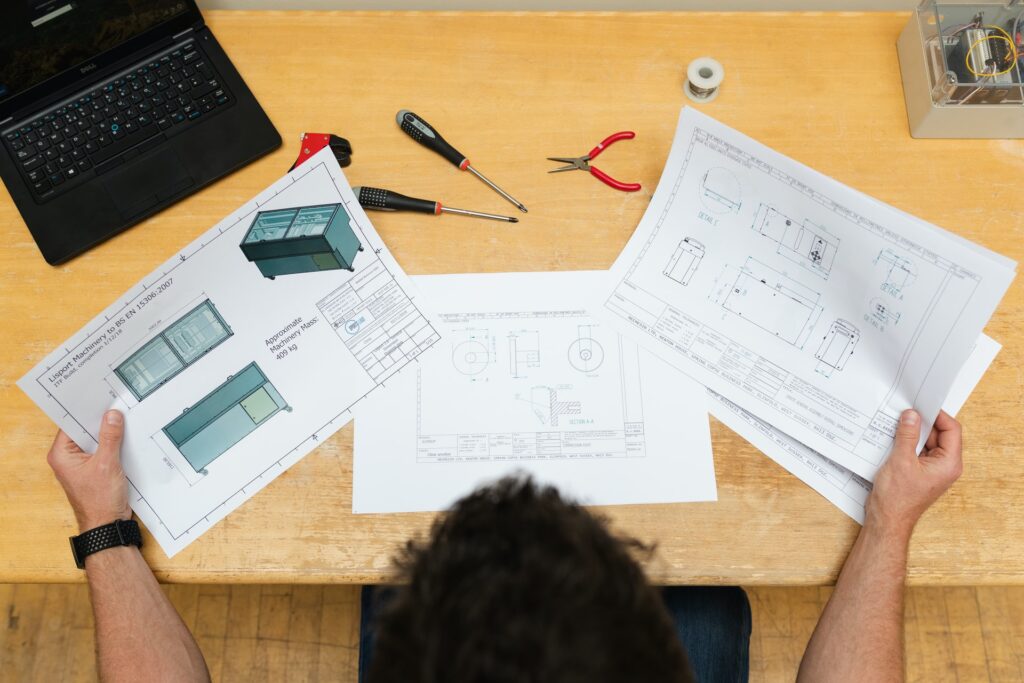Have you ever wondered what is the difference between mechanical vs energy engineering? Well wonder no more! Read on to find out everything you need to know about these similar engineering disciplines. You may be surprised at what you learn!
Mechanical vs Energy Engineering
Mechanical Engineering
Mechanical engineering is a versatile and diverse profession that is concerned with designing, inventing, analyzing, controlling, testing, manufacturing, and marketing components and systems. Mechanical engineering plays a crucial role in conventional industries as well as emerging technologies. Current and future achievements in energy and defense, aerospace, as well as the promise of advanced materials, high-technology manufacturing, and health-related instrumentation and mechanisms, are driven by the creativity and talent of mechanical engineers.
Mechanical engineers use energy principles and mechanics to design a wide variety of machines, devices, and systems, including complex human-machine systems, for energy conversion, biofuel production, materials processing, environmental control, transportation, materials handling, and other purposes. They may develop robots for space exploration, use a computer to simulate the freezing of human cells, or improve devices for use of alternative energy sources, such as fuel cells, wind turbines, and solar energy converters.
A bachelor’s degree in mechanical engineering is typically required to work in the field, according to the U.S. Bureau of Labor Statistics (BLS), but there are related sub-fields of engineering (e.g., aerospace engineering) with overlapping competencies and training. Other sub-fields of note are alternative energy and remanufacturing—the process of rebuilding products after they have worn out.
Energy Engineering
Energy engineering or energy systems engineering is a broad field of engineering dealing with energy services, energy efficiency, facility management, plant engineering, environmental compliance, sustainable energy and renewable energy technologies. It is one of the more recent engineering disciplines to develop. Energy engineering combines knowledge from the fields of math, physics, and chemistry with economic and environmental engineering practices.
Energy engineers apply their skills to increase efficiency and further develop renewable sources of energy. The main responsibility of energy engineers is to find the most efficient and sustainable ways to operate buildings and manufacturing processes. Energy engineers audit the use of energy in those processes and suggest ways to improve the systems. This means suggesting better insulation, advanced lighting, more efficient heating and cooling properties of buildings. Although an energy engineer is concerned about obtaining and using energy in the most environmentally friendly ways, their field is not limited to strictly renewable energy like solar, hydro, biomass, or geothermal.

The first step to becoming an energy engineer involves earning a bachelor’s degree. Bachelor’s degree programs are available as a Bachelor of Science in Energy Engineering, Bachelor of Science in Mechanical and Energy Engineering, or a bachelor’s degree in energy systems engineering. These 4-year programs include classes in chemical science, mechanics, differential equations, power electronics, renewable energy systems, energy systems, and hybrid transportation.
Mechanical vs Energy Engineering Education
Mechanical Engineering
Engineers must combine a good understanding of mathematics, science, and computers with an understanding of technology. At the high school level, the emphasis is on mathematics. Two years of algebra plus courses in geometry and trigonometry generally are required.
In addition to the sciences and math, engineers need good communication skills, so don’t neglect the liberal arts and humanities. In addition, remember that many of the large industrial firms that employ mechanical engineers are multinational. That means a second language can be extremely valuable in your career.
At the university level, mechanical engineering majors can expect to learn advanced mathematics, chemistry, calculus, and physics. After some of these core courses, mechanical engineering majors take specialized courses in:
- Environmental science
- Fluid dynamics
- Manufacturing processes
- Materials science
- Robotics
- Thermodynamics and heat transfer
A typical Bachelor of Science in mechanical engineering requires courses in communications (composition, technical writing), humanities (history language, political science), basic science (chemistry, physics), business (accounting, marketing), mathematics, and basic engineering and computer skills. Usually the core mechanical engineering classes (fluid mechanics, engineering design, heat transfer) begin in the sophomore year.

Energy Engineering
To become an energy engineer, you need to complete an engineering degree (in a field such as petroleum engineering or energy engineering), or a graduate degree in a relevant field of science (such as chemistry, environmental science or renewable energy).
Relevant subjects could include:
- Chemical engineering
- Electrical engineering
- Energy engineering
- Environmental engineering
- Environmental sciences
- Mining or petroleum engineering
- Renewable or sustainable energy
Some bachelor’s degree programs allow students to complete an internship during their studies. These opportunities may provide students with hands-on experience working in the field. They also allow for networking opportunities, which may make it easier to find a job after graduation.
The second step to becoming an energy engineer involves simply working as an engineer. Working as an energy engineer usually requires work experience. However, some employers hire individuals to work as junior engineers. These positions often don’t have experience requirements and are available to recent engineering program graduates.
The third step to becoming an energy engineer consists of earning a professional engineering license. Many states require that engineers be licensed, regardless of the type of engineering they perform. Usually, becoming licensed requires possessing at least a bachelor’s degree from an officially accredited school, having four to six years of work experience, and passing an exam. Many employers only hire licensed applicants.
Mechanical vs Energy Engineering Careers
Mechanical Engineering
Mechanical engineering is the most straightforward career path for a student who majors in mechanical engineering. Mechanical engineers are creative inventors who specialize in developing, designing and perfecting mechanical devices. These professionals work to create new mechanical objects such as engines, automotive parts, electric generators, air conditioners, tools, sensors and related items.
Some of the most common job functions of a mechanical engineer are:
Product Design
Designing products ranging from biomedical devices to internal combustion engines to fuel-efficient motor vehicles, motors and appliances.
Research and Development
Researching new ideas and solutions that satisfy society’s demands or improving or expanding older ideas and solutions.
Manufacturing
Designing and building the machines that mass produce consumer products. Of prime importance is designing and building machines that improve operating efficiency.
Systems Management
Managing the operations of a large system, such as a manufacturing facility or a power plant.
Energy
Planning how energy is created, stored and moved in industries that produce and deliver electrical power, such as natural gas, oil and alternative energy.
Energy Engineering
Like most engineers, those working in the energy sector have a pretty diverse brief, and are tasked both with the reduction of existing energy consumption, and the improvement and development of technologies to produce energy more efficiently. As such, the optimal energy engineer is an optimizer and problem solver by nature.
It’s a highly specialized area of work and typically requires a post graduate qualification, but that’s okay, you’re a smart bunch. And actually, there are exceptions to this rule as some institutions offer energy engineering programs which allow you to circumvent that need.
Due to the broad definition of an energy engineer, it’s not feasible to list every subcategory:
Green Building Engineer
The typical median salary in the United States is around $100,000 per year.
Energy Systems Engineer (ESE)
The typical median salary in the United States is roughly $85,000 per year.
Alternative / Renewable Energy Engineer
The typical median salary in the United States is about $70,000 per year.

Huge renewable energy projects are coming online all over the world. And the trend only looks set to increase. These include 2000-megawatt solar arrays, 6800-megawatt wind farms, wave power generators and geothermal power plants. Thankfully, nuclear and coal power stations are falling behind the constant innovation of the renewable energy sector. This is because of impressive technological advances which have decreased their overall cost.
Mechanical vs Energy Engineering Job Description
Mechanical Engineer
Mechanical engineers design power-producing machines, such as electric generators, internal combustion engines, and steam and gas turbines, as well as power-using machines, such as refrigeration and air-conditioning systems. Mechanical engineers design other machines inside buildings, such as elevators and escalators.
Some job responsibilities of a mechanical engineering include:
- Assess all mechanical plans and procedures as well as electrical processes in order to ensure maximum productivity; use knowledge regarding motion, mechanics and materials to assist.
- Build methods of manufacturing by developing machinery that can fulfill tasks efficiently; use parts to assemble new equipment or adjust existing machines.
- Compile data about products in a shared computer software program
- Create company materials by using the principles of mechanical engineering; use customer input and product specifications to achieve this.
- Design a way to test the parameters of systems in order to understand the limitations of a product.
- Follow all local and federal compliance rules in order to preserve the company’s good standing.
- Help maintain all equipment that the company uses by keeping accurate records of repair, maintenance and sale.
- Lead the testing and product quality assurance system by designing procedures to ensure all problems are noted and addressed.
- Present information to company leaders about each product line or manufacturing process.

Energy Engineer
Energy Engineers design, develop, or evaluate energy-related projects or programs to reduce energy costs or improve energy efficiency during the designing, building, or remodeling stages of construction. May specialize in electrical systems; Heating, Ventilation, and Air-Conditioning (HVAC) systems; lighting; green buildings; air quality; or energy procurement. They also identify and recommend energy savings strategies to achieve more energy-efficient operation.
Some job responsibilities of an energy engineer include:
- Determine energy savings compared to baseline equipment and building codes performing different engineering calculations for high efficiency equipment and machinery.
- Determine performance and energy savings for system modifications and improvements.
- Establish and perform energy use benchmarks (Energy Star).
- Implement Commercial and Industrial Conservation and Load Management (C&LM) programs.
- Research and explain greenhouse gas reduction opportunities.
- Revise engineering design drawings, specifications and reports to validate energy savings.
- Search and present energy conservation projects comprising capital and operational measures.
- Verify installation of energy efficiency measures working on field inspections.
If you have anything to add, please feel free to leave a comment down below, and sign up to our newsletter for more of the same content!



1 thought on “Mechanical vs Energy Engineering”
Interesting comparison. I’ve worked in both mechanical and energy sectors. I’d add that in which you have Interest is a key difference between the two. Also visit us at: https://www.monarch-innovation.com/machine-design-development